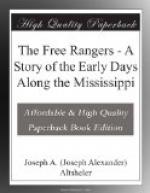“Of course,” said Henry. “We thank you for your aid.”
They saw in a moment how valuable this help could be as Mr. Pollock spoke rapidly in Spanish to one of the sentinels, who seemed impressed, and who quickly disappeared within the house. They spent some anxious minutes in waiting, but the sentinel returned in a few minutes with word that they would be received.
“That is good,” said Mr. Pollock to the five. “It is well to strike before the blow of Alvarez sinks in too deeply.”
They entered an ante-chamber furnished with a splendor that the Kentuckians had never seen before. There were pictures and the arms of Spain upon the walls, and rich heavy rugs upon the floor. The sentinel said something in Spanish to Mr. Pollock and the merchant laughed.
“He makes the polite request,” said Mr. Pollock, “that you leave your rifles here. Ah, you see that the fame of the Kentucky rifle has already reached New Orleans. They will be perfectly safe, I assure you.”
The five leaned their rifles in a row against the wall, long, slender-barreled weapons, which were destined to make one day an unparalleled record before this very city of New Orleans.
A wide door was thrown open and an attendant dressed in gorgeous Spanish livery announced their names as they entered a large room furnished with as great a degree of state as could be reproduced at that time in New Orleans. An armed soldier stood on either side of the door, and, at the far end of the room, sitting in a great chair on a slightly raised platform, was a handsome, youngish man in the uniform of a Spanish colonel. He had a strong, open countenance, and the five knew that it was Bernardo Galvez, the Governor General of Louisiana. The favorable impression of him that they had received from reports was confirmed by his appearance.
Bernardo Galvez rose with punctilious courtesy and saluted Oliver Pollock, who introduced in turn the five, to every one of whom the Governor General gave a bow and a friendly word. Like all others in New Orleans who had seen them, he bestowed an admiring look upon their size, their straightness, and above all, the extraordinary air of independence and resolution that characterized every one of them, indicated, not by the words they said or the things they did, but by an atmosphere they created, something that cannot be described. They had never been in such a room before, one containing so much of the splendor of old Europe, but they were not awed in the least by it, and Bernardo Galvez knew it.
Oliver Pollock, the shrewd merchant and patriot, man of affairs, and judge of his kind, observed them closely and, observing, he felt a great thrill of satisfaction. The five, boys though two of them were, had felt the vast importance of their mission and, now that they had come, he too, felt it. It was a most critical and delicate moment for the struggling young nation. He knew much of Francisco Alvarez, and he surmised more.




